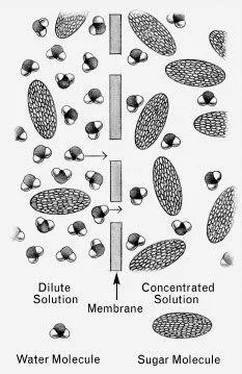Marlene Parrish - What Einstein Told His Cook 2
Здесь есть возможность читать онлайн «Marlene Parrish - What Einstein Told His Cook 2» весь текст электронной книги совершенно бесплатно (целиком полную версию без сокращений). В некоторых случаях можно слушать аудио, скачать через торрент в формате fb2 и присутствует краткое содержание. Год выпуска: 0101, Издательство: W. W. Norton & Company, Жанр: Кулинария, на английском языке. Описание произведения, (предисловие) а так же отзывы посетителей доступны на портале библиотеки ЛибКат.
- Название:What Einstein Told His Cook 2
- Автор:
- Издательство:W. W. Norton & Company
- Жанр:
- Год:0101
- ISBN:нет данных
- Рейтинг книги:4 / 5. Голосов: 1
-
Избранное:Добавить в избранное
- Отзывы:
-
Ваша оценка:
- 80
- 1
- 2
- 3
- 4
- 5
What Einstein Told His Cook 2: краткое содержание, описание и аннотация
Предлагаем к чтению аннотацию, описание, краткое содержание или предисловие (зависит от того, что написал сам автор книги «What Einstein Told His Cook 2»). Если вы не нашли необходимую информацию о книге — напишите в комментариях, мы постараемся отыскать её.
What Einstein Told His Cook 2 — читать онлайн бесплатно полную книгу (весь текст) целиком
Ниже представлен текст книги, разбитый по страницам. Система сохранения места последней прочитанной страницы, позволяет с удобством читать онлайн бесплатно книгу «What Einstein Told His Cook 2», без необходимости каждый раз заново искать на чём Вы остановились. Поставьте закладку, и сможете в любой момент перейти на страницу, на которой закончили чтение.
Интервал:
Закладка:
The more acidic the marinade, the shorter its optimum tenderizing time will be. In order of increasing acidity, a marinade may contain yogurt, buttermilk, beer, tomato juice, wine, orange juice, vinegar, lemon juice, or lime juice. Tenderizing marinades usually also contain an oil, because meats that are tough tend to be lean and dry as well. (The “juiciness” of meat is due at least as much to fat as to water.) Prepared vinaigrette salad dressings can serve as a double-threat marinade, because their vinegar tenderizes while their oil and condiments improve juiciness and flavor.
But how long, O Lord? With all of these variables, there can be no universal recommendation for marinating times. To quote conventional wisdom, however, most fish flesh is tender and somewhat porous, requiring short marinating periods of only 10 to 15 minutes. Dense-fleshed fish such as tuna and salmon may require twice that amount of time. Chicken may require 2 to 4 hours if skinless and 6 hours or more with the skin on. Various cuts of beef and pork are usually marinated for anywhere from 4 to 8 hours, the latter period of time often being referred to as overnight. Leave it much longer than that and the acid in a marinade can reconfigure the meat’s protein molecules into tighter, more compact shapes, making the surface tougher. So don’t sleep too late. And don’t expect miracles. Tenderness is achieved only by selecting tender cuts of meat or by long, slow, moist cooking.
All of this having been said, the first law of marinating is Follow the Recipe. Any recipe worth its salt and pepper, taken from a reliable publication, has been tested and retested until it came out just right. The marinating time is simply another ingredient, like an amount of chopped onion or garlic, and shouldn’t be monkeyed with. (Except that in my opinion one can always add more garlic.)
The most convenient way to marinate meat—and for safety’s sake it must be done in the refrigerator—is in a sealed zipper-top plastic bag after you squeeze out most of the air to maximize liquid-to-surface contact. If you want to use the marinade to baste with during subsequent grilling or to make a cooked sauce, set aside some of it for that purpose before you add the meat, because even in the best of households raw meat can harbor pathogenic bacteria. Discard the rest of the marinade after it has done its job on the meat.
THE FOODIE’S FICTIONARY:French dressing— habillement
Sidebar Science: Don’t be a sucker
THERE AREa number of vacuum gadgets on the market that purport to speed up marinating. Even some commercial meat processors use them. But they’re pure deception.
You’re supposed to put your meat into a sealed container and pump most of the air out with a small hand-operated or electric pump. The idea is that as the air is sucked out of the meat’s pores and channels, they’ll absorb the marinade more quickly—“in minutes, not hours.”
I never really bought this idea.
Just think about it. Sucking the air out of channels in the meat would collapse them, not open them up. It’s like attaching a vacuum pump to a garden hose. Moreover, because the degree of vacuum (the air pressure ) is the same everywhere in the container—in the meat and in the space around it—there is no force that could induce the liquid to flow from one location to the other. It’s like expecting water to flow through a hose without any force, such as gravitation or a pressure difference, propelling it.
What does the research say? L. L. Young and D. P. Smith of the USDA’s Agricultural Research Service ( Poultry Science 83:129–131, 2003), marinated 256 chicken half-breasts either with or without vacuum for 30 minutes. They found that the vacuum increased absorption of the marinade slightly (by about 10 percent, according to an earlier study by the same group), but that “the added marinade is lost prior to or during cooking.” Their conclusion: “Under the conditions of this study, vacuum appears to offer no real advantage over marination without the vacuum.”
I decided to run my own experiments to see if I could tell what was actually happening to the meat. Instead of buying a—no kidding—Rhyme of the Instant Marinator (haha) for $24.95 plus shipping, I built my own from a clear glass vinegar bottle and a VacuVin: a pump-and-stopper device for pumping air out of partially empty bottles of wine, presumably so the wine doesn’t oxidize when kept for several days before being tapped again. (I haven’t done tests to see if wine really does keep longer when the bottle is pumped out by the VacuVin, but I have my doubts. Nevertheless, it makes me feel sophisticated to use it.)
I put some mock marinade (water, vinegar, and green food coloring) into the bottle, added pieces of flank steak, inserted the VacuVin stopper, attached the hand pump, and pumped the air out. (It should be realized that a pump can reduce the amount of air in a container, but it cannot create an actual vacuum, i.e., a space with no air in it at all. All a pump can do is reduce the air pressure, producing a partial vacuum .)
As I pumped the air out, I was fascinated to see the pieces of meat float up to the surface of the marinade! Dozens of tiny bubbles had emerged from the meat as I pumped; they adhered to the meat’s surfaces and carried it upward like so many miniature life preservers. (The bubbles were too small to overcome their surface-tension-induced adherence to the meat and rise independently to the surface.)
Aha, then! Air was being sucked out of the meat’s pores and channels, collapsing them as I had predicted, rather than opening them up.
After five or more minutes of marinating in repeated tests, I let the air back in. The bubbles mostly disappeared, because the air pressure now exceeded the pressure inside the bubbles, and the meat pieces promptly sank.
But did they sink because they had lost their bubbles, or because they had become heavier by sucking some marinade into their evacuated channels like a squeezed sponge suddenly being released under water—and thereby accomplishing the marinating task after all?
I removed the meat from the marinade and shaved off thin slices with a razor blade. There was virtually no evidence of the green marinade inside the meat, although the connective tissue on its surface had been dyed.
So should you buy a vacuum marinator? No. Any slight amount of marinade absorption that may take place when you release the vacuum, regardless of how long the meat had been marinating, is likely to be lost when you cook it, as was found by the USDA researchers.
Don’t be sucked in by a “vacuum marinator.”
Marinated Skirt Steak Fajitas
Skirt steak, which is the diaphragm that separates the chest and abdominal cavities of the animal, has a rich, beefy flavor. It used to be hard to find, but since fajitas have become popular, the cut is readily available at the supermarket. The thinness and loose grain of this rather tough cut make it a good choice for marinating.
In Mexican slang, a fajita is a small “belly band,” girdle, or cummerbund. Edible fajitas are so named because of how the meat and other ingredients are wrapped into a tortilla.
A pile of corn chips on the side and a bowl of warm black beans or cool black bean salad are good companions to this dish.
2 tablespoons olive oil
2 tablespoons freshly squeezed lime juice
2 cloves garlic, coarsely chopped
1 jalapeño pepper, seeds and ribs removed, coarsely chopped
2 small or 1 large skirt steak, about 2 pounds total
2 large, mild onions, sliced
Читать дальшеИнтервал:
Закладка:
Похожие книги на «What Einstein Told His Cook 2»
Представляем Вашему вниманию похожие книги на «What Einstein Told His Cook 2» списком для выбора. Мы отобрали схожую по названию и смыслу литературу в надежде предоставить читателям больше вариантов отыскать новые, интересные, ещё непрочитанные произведения.
Обсуждение, отзывы о книге «What Einstein Told His Cook 2» и просто собственные мнения читателей. Оставьте ваши комментарии, напишите, что Вы думаете о произведении, его смысле или главных героях. Укажите что конкретно понравилось, а что нет, и почему Вы так считаете.












